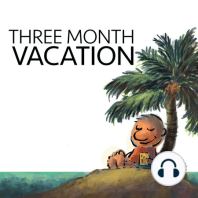21 min listen

Smart Waiting Lists: 3 Elements That Create Waiting Lists that Work
Smart Waiting Lists: 3 Elements That Create Waiting Lists that Work
ratings:
Length:
36 minutes
Released:
Mar 11, 2018
Format:
Podcast episode
Description
A waiting list seems to be both a barrier and an enticement The problem with waiting lists is that they fail, and fail miserably if you don't get the elements right. So what are the elements that contribute to a really smart waiting list? Let's find out in this episode, shall we? Click to read online: 3 Elements That Create Waiting Lists that Work: Episode 183 ======== Why do most of us prefer Friday to Sunday? It's odd when you think about it, right? Friday is a working day (in most countries), and Sunday is a day of rest. Yet we wait with baited anticipation for Fridays. The reason is probably apparent to you by now. Friday clearly and consistently holds the promise of the weekend that is to follow. We all know what follows Sunday, don't we? Anticipation—that's one of the big reasons that you need to have a waiting list Anticipation creates an enormous amount of drama in our minds. If you have to wait for something, there's a pretty good chance you're going to value the product or service a lot more than if you hit some magic button and got an instant delivery. We create waiting lists for three core reasons: The first reason is the anticipation The second is to create a barrier And finally to get a commitment. Let's take a deeper dive, shall we? 1: Anticipation In 2010, some British ministers came up with an incredibly interesting, if slightly preposterous idea. If you were going to apply for British citizenship, you had to learn to queue. Phil Woolas, the immigration minister at the time was dead serious when he suggested that to-be citizens would need to learn to queue. He said: “The simple act of taking one's turn is one of the things that holds our country together. It is very important that newcomers take their place in queues whether it is for a bus or a cup of tea. It is central to the British sense of fair play, and it is also better for everyone. Huge resentment is caused when people push in.” There you go—anticipation in a nutshell And you know something, the British are spot on when it comes to creating anticipation. We like stuff better when we have to wait. Tali Sharot, associate professor of cognitive neuroscience in the Department of Experimental Psychology at University College London gives a simple example of how anticipation works. Regardless of the outcome, the pure act of anticipation makes us happy The behavioural economist George Lowenstein asked students in his university to imagine getting a passionate kiss from a celebrity, any celebrity. Then he said, “How much are you willing to pay to get a kiss from a superstar if the kiss was delivered immediately, in three hours, in 24 hours, in three days, in one year, in 10 years? He found that the students were willing to pay the most not to get a kiss immediately, but to get a kiss in three days. They were willing to pay extra to wait. Now they weren't willing to wait a year or 10 years; no one wants an ageing celebrity. But three days seemed to be the optimum amount. So why is that? Well if you get the kiss now, it's over and done with. But if you get the kiss in three days, well that's three days of jittery anticipation, the thrill of the wait. The students wanted that time to imagine where is it going to happen, how is it going to happen. Anticipation made them happy. A waiting list is all about anticipation, isn't it? No matter whether you're about to sell a product, service or training, it would do us all a bit of good to create a waiting list. And waiting lists work for a simple reason: it creates a feeling of scarcity—even if you're not exactly well known in your field. Take the example of Joseph Pilates, for example. When Pilates started out his studio, he wasn't just an unknown; he was also an immigrant to the US with a German accent. That didn't exactly stop Pilates from creating a waiting list. He started his exercise regimen near a niche audience—dancers. Despite being brand new in the business, Pilates never agreed to see a client right away.
Released:
Mar 11, 2018
Format:
Podcast episode
Titles in the series (100)
Why We Sell Less: The Root of Confidence: The hardest thing in business?or life is the factor of confidence. Whether you're in online marketing, selling products or services, or run a physical store, the confidence goes up and down. And yet, confidence is what creates sales. Sales, after all,... by The Three Month Vacation Podcast